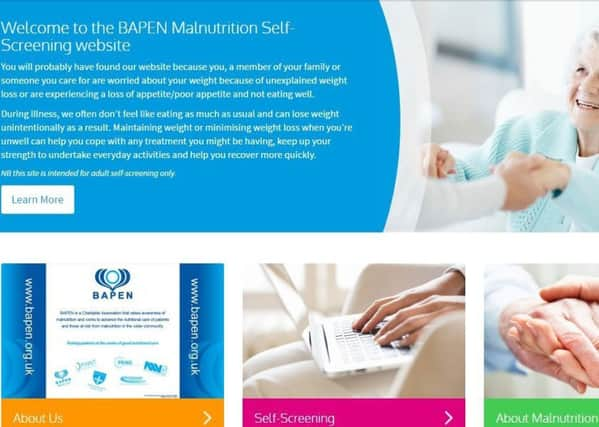Health Column - Helping people to identify the signs of malnutrition online


Maybe your wedding ring has become too loose for you and your mood is low, or you can’t find the energy to cook and tend to just have a sandwich or cheese on biscuits for your meals? If so, you could be one of the 3 million people in the UK affected by malnutrition.
Malnutrition in the UK is more common than you would imagine, people usually think of malnourished people as living in famine stricken countries but it can, and does, happen here and is caused by either an inadequate diet, poor appetite or a problem absorbing nutrients from food.
Advertisement
Hide AdAdvertisement
Hide AdThere are many reasons why this might happen including a recent stay in hospital, a long term condition, lack of mobility, low income, bereavement or social isolation.
Anyone can develop malnutrition but those at highest risk include: people over the age of 65, particularly if they are living in a care home or nursing home, or admitted to hospital; people with long term conditions such as diabetes, kidney disease and chronic lung disease; people with chronic progressive conditions such as dementia or cancer; people who abuse alcohol or drugs.
Malnutrition can be difficult to identify and those who are obese or overweight are not immune from it. It can happen very gradually so can be difficult to spot in the early stages, but the most common sign is unintentional weight loss in the last 3-6 months.
However, you might not weigh yourself regularly so you might notice other things, such as clothes, rings, watches and dentures becoming loose.
Advertisement
Hide AdAdvertisement
Hide AdOther signs to look out for include: loss of appetite; tiredness, loss of energy; reduced ability to perform normal tasks; not being able to walk as far as normal; changes in mood – some people can feel like they can’t be bothered with anything or more depressed; an increase in infections and illnesses; poor concentration and poor growth in children
There is an online tool that you can use to self assess your risk of malnutrition, you can access this at http://www.malnutritionselfscreening.org/
The good news is that by identifying that you, or someone you care for, is at risk of malnutrition you can take steps to treat it and improve health.
You should speak to your GP to ensure that there is not an underlying health problem causing the weight loss and you may be referred to a dietitian to help manage your diet.
Advertisement
Hide AdAdvertisement
Hide AdIf cooking is a problem then you could make use of the meal delivery service which is available to Western Isles residents. For further information on the meal delivery service please email: [email protected] or telephone (01870) 602696.
Having company at mealtimes can also help so having meals with friends or going along to a lunch club such as the one in the Retirement Centre, Bayhead, Stornoway, may help.
If you would like to self-refer to a dietitian then please contact the NHS Western Isles Department of Nutrition and Dietetics at Western Isles Hospital, tel. (01851) 708279 or email: [email protected]